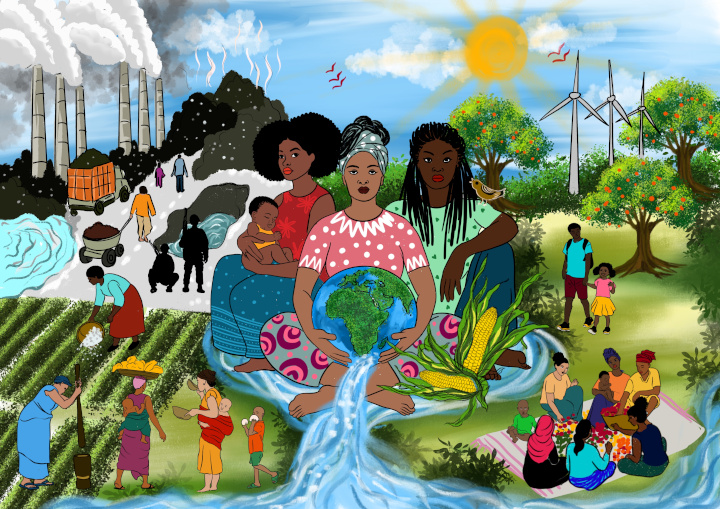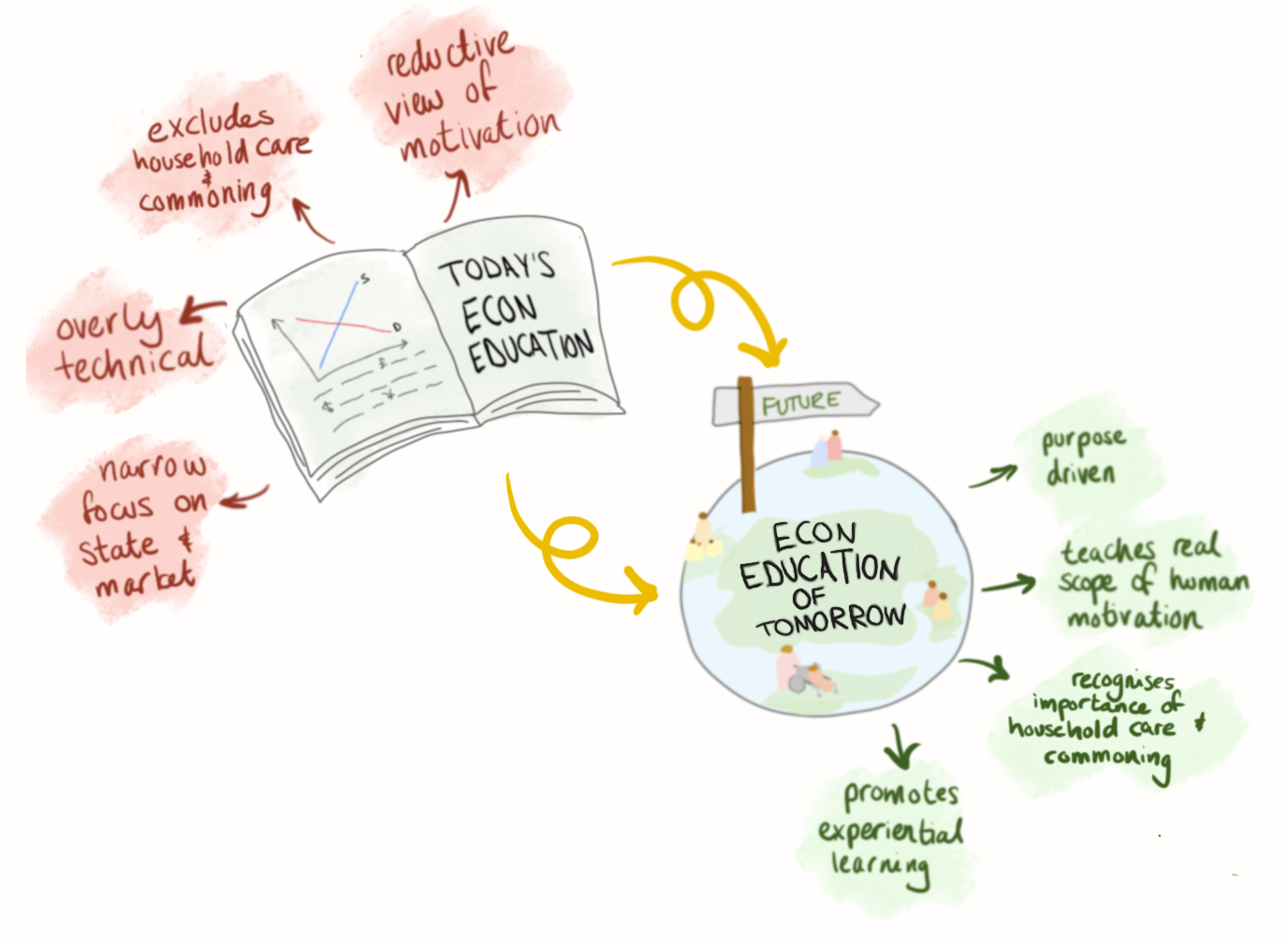
March 10, 2025
After decades of delay, the move from burning fossil fuels to renewables is firmly underway – but the fairness of this unfolding transition is not inevitable. In fact, there is a real danger the world will simply swap one exploitative and unjust system for another. Natalie Shortall introduces a new Oxfam paper that calls on the UK to get wholeheartedly behind a “just transition”.
Read more >>

Global South feminists know how our fixation with GDP hurts people and planet: it’s time to listen to them
December 20, 2024
The world needs to stop relying on a metric that ignores two thirds of the work done by women and which promotes harmful policies, says Oxfam GB CEO Halima Begum. A new collection of feminist think pieces offers a compelling and inspirational tour of the arguments and pathways for moving Beyond GDP.
Read more >>

It’s time to put care at the centre of our economics courses
November 19, 2024
The UK government’s Francis Review of the English school curriculum is an unprecedented chance to shift the national and global conversation on economics education: let’s not miss it, say Alex Bush and Jennifer Brandsberg-Engelmann. They explain why we need to change an economics curriculum which perpetuates narratives that are bad for people and planet and erase care work.
Read more >>

How billionaire ‘pollutocrats’ are driving our climate crisis – and what we can do about it
October 31, 2024
If everyone used private jets and superyachts like 50 of the world’s richest billionaires, the remaining carbon budget to stay within 1.5C would be burned up in just two days. Nafkote Dabi introduces Oxfam’s new climate report, which spells out how the emissions of the super-rich are driving inequality, hunger and heat-related deaths.
Read more >>
The world’s top 100 economies: 31 countries; 69 corporations
September 15, 2016
The campaigning NGO Global Justice Now (formerly World Development Movement) have done us all a favour by updating the table comparing the economic might of the largest countries and corporations. Headline finding? ‘The number of businesses in the top 100 economic entities jumped to 69 in 2015 from 63 in the previous year’ according to the Guardian’s summary. The last
Read more >>
Here’s a summary of The Economist’s important critique of GDP and suggestions for reform
May 6, 2016
‘Laws are like sausages, it is better not to see them being made’ said Otto von Bismarck. Turns out you can probably add GDP to that list. Last week’s Economist had a comprehensive takedown of the uses and abuses of Gross Domestic Product as an indicator of wellbeing, economic health or pretty much anything else. People have been critiquing GDP
Read more >>
What happens if you combine life expectancy and GDP into a single indicator? (You spend more on health)
January 28, 2014
Just been skimming the overview of last December’s report of the Lancet Global health 2035 Commission, chaired by Larry Summers. The report advocates increasing health spending to close the health gap between countries, but the thing that jumped out at me was the practical application of ‘beyond GDP’ thinking in what the report calls the ‘full income approach’: “But while
Read more >>
Oil spills, prisons and the madness of GDP
July 3, 2013
“Average national income is a notoriously imperfect measure of the average person’s well-being. The 2010 BP oil spill in the Gulf of Mexico – with clean-up and damage costs of $90 billion – added about $300 to the average American’s “income.” But it added nothing to our well-being. The world’s most expensive prison system, costing almost $40 billion per year,
Read more >>
Why do some (better) alternatives to GDP get picked up, while others sink without trace? Useful new study on political economy of indicators.
February 5, 2013
Took me a while to overcome my reluctance to read a document subtitled ‘Deliverable 1.1’ on the front page (yuk), but I’m glad I did so. The paper ‘Review report on Beyond GDP indicators: categorisation, intentions and impacts’ (cracking title too…..) is published by BRAINPOoL – ‘Bringing Alternative Indicators into Policy’ (is that the sound of teeth grinding?). The authors
Read more >>
Joe Stiglitz addresses ‘the movement’ on well-being v GDP
October 29, 2009
I’m still surrounded by the world’s statisticians (not as bad as it sounds) at the OECD Measuring the Progress of Societies conference in South Korea, where yesterday Joe Stiglitz gave a great presentation. Rather than simply rehearse the findings of his commission’s report to President Sarkozy, he reflected on why criticisms of GDP, which have been around for almost as
Read more >>
How could we measure well-being in a crisis? Some thoughts from Korea
October 28, 2009
I am currently in Korea’s second city, Busan, attending a big OECD conference on ‘statistics, knowledge and policy’, organized by its ‘Measuring the Progress of Societies’ project. The massive conference centre looks out on a consumerist paradise, including a giant Tesco’s supermarket (everything’s big here, giving you that sense of suddenly having shrunk that you get in Tiananmen square) and
Read more >>
Do we need to ration growth, and if so, who gets what’s left?
September 30, 2009
Spoke at a Quaker conference on the ‘zero growth economy’ at the weekend. Quaker meetings are different: when I finished speaking to an audience of 350 people, there was total hear-a-pin-drop silence. Instead of clapping, people reflect, eyes closed, on what they have just heard. And no, even though it was after lunch, they weren’t asleep (well, most of them) and it
Read more >>